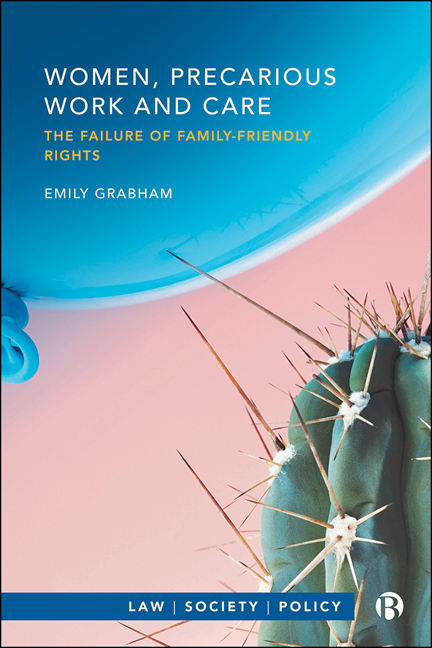Book contents
- Frontmatter
- Contents
- List of Figures
- Acknowledgements
- Series Editor’s Preface
- one Introduction
- two Starting and Surviving in Precarious Work
- three Providing Care: Daily Routines and Experiences
- four Care Networks
- five “Rocking the Boat”: Talking about Care in a Precarious Job six How Employers Responded
- six How Employers Responded
- seven What Women Did Next
- eight Care-Friendly Rights for Precarious Workers
- Appendix How the Research Was Conducted
- Index
Appendix - How the Research Was Conducted
Published online by Cambridge University Press: 13 May 2022
- Frontmatter
- Contents
- List of Figures
- Acknowledgements
- Series Editor’s Preface
- one Introduction
- two Starting and Surviving in Precarious Work
- three Providing Care: Daily Routines and Experiences
- four Care Networks
- five “Rocking the Boat”: Talking about Care in a Precarious Job six How Employers Responded
- six How Employers Responded
- seven What Women Did Next
- eight Care-Friendly Rights for Precarious Workers
- Appendix How the Research Was Conducted
- Index
Summary
This report draws on in-depth interviews conducted with 33 women from across the mainland UK, and on legal research into family-friendly employment rights. The research explored two core questions:
1. What are the experiences of women who balance unpaid care with precarious work?
2. To what extent does current UK employment law recognize those experiences?
‘Precarious work’ is defined in this project as:
A. work that falls outside of the ‘standard employment relationship’ or model due to length or type of contract (for instance, temporary or ‘zero-hours’ contracts), or
B. work that is precarious for another reason identified by an interview respondent, including institutional factors concerning the structure and allocation of work through organizations (for example, a long-term, very short hours, permanent contract in a supermarket exposing the worker to insufficient pay and restricted career development).
Interviews
Interviews were conducted between June 2015 and January 2017 and aimed to capture women's experiences of balancing precarious paid work alongside unpaid care obligations. Interviews were unstructured, with some prompts, and most lasted about an hour. Recruitment took place via emails and flyers distributed through advisory board contacts, snowballing, and via in-person approaches at legal advice centres (with the prior agreement of advice organizations). Recruitment strategies were altered throughout the study in response to sampling and monitoring of general uptake. Sampling took account of geographical location, type of work, type of contract, self-defined ethnicity, type of care obligation, educational attainment and parenting status.
Interviewees were all women with current or recent experience of precarious work and unpaid care living in the mainland UK (Dundee, Glasgow, Durham, York, Leeds, Liverpool, Stoke-on-Trent, Manchester, Nottingham, Milton Keynes, Ebbw Vale and London). Care obligations included care for dependent children, adults and those with disabilities. Most interviews were conducted in person, although some happened over telephone or Skype, and some were conducted as ‘walking interviews’. Where possible, interviewees were asked to sketch their experiences of balancing care with precarious work. Supermarket vouchers were offered to interviewees as a thank you. Interviews were recorded and transcribed with the interviewees’ permission, and anonymized transcripts were, when possible, sent to interviewees for their input prior to being analyzed.
- Type
- Chapter
- Information
- Women, Precarious Work and CareThe Failure of Family-friendly Rights, pp. 162 - 165Publisher: Bristol University PressPrint publication year: 2021



